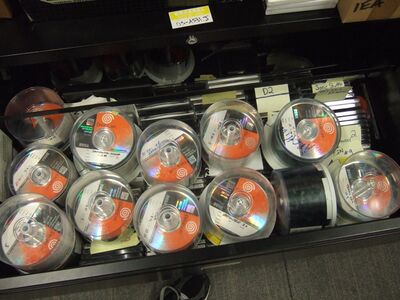GD-ROM: Difference between revisions
Jump to navigation
Jump to search
No edit summary |
No edit summary |
||
| Line 1: | Line 1: | ||
The GD-ROM format is Sega's proprietary disc format used for the Sega Dreamcast home console, as well as for the arcade systems [[NAOMI]], [[NAOMI 2]], Triforce, and Chihiro. | The GD-ROM format is Sega's proprietary disc format used for the Sega Dreamcast home console, as well as for the arcade systems [[NAOMI]], [[NAOMI 2]], Triforce, and Chihiro. | ||
These discs contain a low density, linearly-read section, a security ring to verify authenticity, and an angularly-read high-density section. | |||
GD-ROMs usually contain a [[0GDTEX.PVR]] image that can be shown on the BIOS CD player screen. | |||
The most common GD-ROM image format is the [[GDI format]]. | The most common GD-ROM image format is the [[GDI format]]. | ||
Latest revision as of 17:56, 1 March 2023
The GD-ROM format is Sega's proprietary disc format used for the Sega Dreamcast home console, as well as for the arcade systems NAOMI, NAOMI 2, Triforce, and Chihiro.
These discs contain a low density, linearly-read section, a security ring to verify authenticity, and an angularly-read high-density section.
GD-ROMs usually contain a 0GDTEX.PVR image that can be shown on the BIOS CD player screen.
The most common GD-ROM image format is the GDI format.
GD-R discs
GD-R discs are the recordable version of Sega's proprietary disc format. GD-Rs lack the security ring between the standard density and high density sections, and thus only boot on a retail Dreamcast system using a System Disc 2. The Katana Dev.box will also play these discs.
